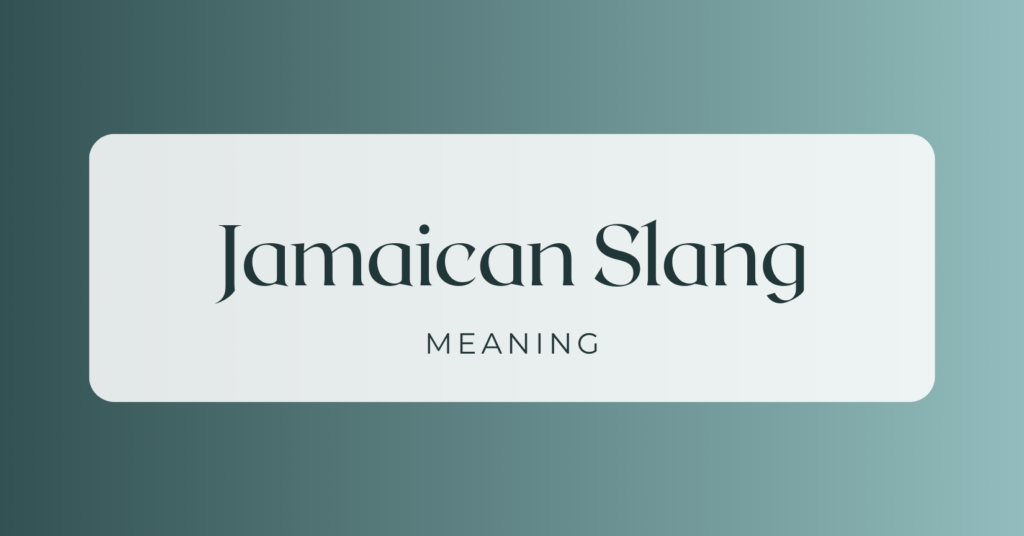Disclaimer: All meanings and explanations provided here are gathered from various public resources and carefully researched to ensure accuracy.
Jamaican slang, known globally through music, media, and its distinct sound, has roots that trace back to the early days of the island’s colonial history. This language, commonly referred to as Jamaican Patois or Creole, is much more than casual speech, it represents a blend of languages, history, and cultural resilience.
Jamaican slang began taking shape in the 17th century, during the transatlantic slave trade. Enslaved Africans from various tribes and linguistic backgrounds were forced to communicate under British colonial rule. This led to a mix of English vocabulary with African linguistic structures from languages like Akan, Igbo, and Yoruba. Words and phrases evolved from necessity, often masking true meanings as enslaved people sought to maintain their culture and resist assimilation.
The Spread of Jamaican Slang through Reggae and Dancehall
Jamaican slang grew in prominence internationally during the 20th century, thanks to the reggae movement led by Bob Marley and other influential artists. Marley’s use of Patois in his songs introduced the world to the expressive power of Jamaican slang. In the 1980s and 90s, dancehall music further popularized slang terms and phrases, like “gyal” for girl or “bwoy” for boy, creating a unique identity for the language in pop culture.
Famous Jamaican Slang Terms
- “Irie”: Meaning “good” or “alright,” this word expresses positivity and calm, often associated with reggae culture.
- “Bredren” / “Sistren”: Meaning brother or sister, often used to signify close friendship or camaraderie.
- “Wah Gwaan”: Translates to “What’s going on?” or “How are you?”—a classic greeting in Jamaican slang.
- “Big up”: Used to show respect or admiration for someone, equivalent to “props” or “shout out.”
- “Yardie”: A term that refers to someone from Jamaica, often used affectionately by Jamaicans abroad.
Looking for the Jamaican way to say “friend” or “bro”? Jamaican Patois has you covered with unique, culturally rich terms.
What is the Jamaican Slang for Friend or Bro
1. Bredren and Bredda:
The term “bredren” (or “bredda”) is one of the most well-known Jamaican slang terms for “brother” or “close friend.” Derived from the English word “brethren,” it conveys a sense of loyalty and deep respect. This term is commonly used by Rastafarians and Jamaican communities worldwide to signify a close male friend, similar to “bro” in English.
- Example: “Mi bredren always have mi back.”
2. Sistren:
For female friends, Jamaicans use the term “sistren.” It serves as a gender-specific term for a close female friend, emphasizing sisterhood and support. “Sistren” is rooted in Jamaican culture and represents a bond of solidarity among women.
- Example: “Mi sistren and I always stick together.”
3. Mi Fren:
“Mi fren” translates directly to “my friend” in English but holds a friendly, casual tone in Patois. It’s used in everyday speech to refer to a friend or companion. This phrase is versatile and used widely, whether in casual chats or social gatherings.
- Example: “Mi fren, yuh good?”
4. Idren:
In Rastafarian culture, “idren” is a unique term meaning “brethren” but with a more spiritual emphasis. It’s often used to address close friends within the Rastafarian community and conveys respect, brotherhood, and unity.
- Example: “Bless up, mi idren.”
5. G and Genna:
“G” and “genna” are more modern slang terms that have gained popularity, especially among younger Jamaicans. Both terms are similar to “homie” or “bro” in American slang and are used to describe a friend who’s part of your close circle.
- Example: “Wah gwaan, mi G?”
Ever wondered how to say “hello” the Jamaican way? Here’s a breakdown of popular greetings that capture Jamaica’s vibrant spirit.
Jamaican greetings are as lively and warm as the island itself. Whether meeting a friend or saying hello to a stranger, Jamaicans have unique ways to express friendliness and respect.
1. Wah Gwaan?
The phrase “Wah gwaan?” is a staple in Jamaican Patois, meaning “What’s going on?” or simply “What’s up?” This greeting is popular across the island and is often used between friends or casual acquaintances. It reflects the laid-back and friendly Jamaican culture.
- Example: “Wah gwaan, mi fren?”
2. Yow!
“Yow!” is another popular greeting, especially among younger Jamaicans. Similar to “Hey” or “Yo” in English, it’s informal and typically used to get someone’s attention. This greeting is quick, direct, and perfectly suited for casual interactions.
- Example: “Yow! How yuh stay?”
3. Bless Up!
“Bless up!” is a versatile phrase, used both as a greeting and farewell. It means “Stay blessed” or simply “Blessings.” Often heard among Rastafarians and in reggae culture, “Bless up” conveys goodwill and positive energy.
- Example: “Bless up, mi bredren!”
4. Greetings
Though slightly more formal, “Greetings” is a warm and respectful way to say hello, especially used among Rastafarians or in more formal settings. It reflects the respectful and communal nature of Jamaican culture.
- Example: “Greetings, mi sistren.”
